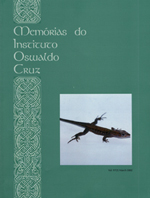
|
Memórias do Instituto Oswaldo Cruz
Fundação Oswaldo Cruz, Fiocruz
ISSN: 1678-8060 EISSN: 1678-8060
Vol. 102, Num. s1, 2007, pp. 3-3
|
Memórias
do
Instituto
Oswaldo
Cruz,
Vol.
102,
No.
Suppl.
I,
2007,
pp.
3-3
FOREWORD
José Rodrigues
Coura, Virgilio
E
do
Rosário Alcue
Health
Project
Coordinator
Code
Number:
oc07125
The ALCUE HEALTH Project is an initiative for collaboration between Latin America, the Caribbean, and the European Union, with the aim of undertaking a series of health-related and quality-of-life activities. Its objectives are to strengthen the capacity for cooperation and develop a critical mass of knowledge within this network in relation to priority public health issues, by means of investigation projects, training programs and workshops, with experts from different countries in Latin America and the Caribbean and from Europe, with a view of transforming the knowledge generated into public health policies and practices.
This first workshop, on "Epidemiological and Social Determinants of Chagas Disease", had the objective of assessing the present situation regarding this disease and the initiatives undertaken for controlling it in the Southern Cone of South America, the Andean Countries, the Amazon Region, Central America, and Mexico. The aim was to obtain basic information for formulating surveillance and control policies, as a model for emerging, reemerging, and neglected infectious diseases.
The workshop discussed the consequences of Chagas disease in non-endemic countries in the light of international migrations, access to diagnosis and treatment for this disease in endemic and non-endemic countries, and a strategic plan for diseases that are not dealt with, in neglected populations. Chagas disease was chosen as a model for this seminar because it is a neglected disease that affects socially excluded groups in 21 countries of Latin America and presents high morbidity and mortality, with intrinsic and extrinsic factors that are related to the poverty cycle, the ecology of its vectors and hosts, and human activities. All of these factors make its control difficult.
Twenty-two
experts
took
part
in
the
workshop,
coming
from
15
countries:
Argentina,
Bolivia,
Brazil,
Colombia,
Costa
Rica,
Ecuador,
Honduras,
Mexico,
Paraguay,
Portugal,
Spain,
United
States,
Switzerland,
Uruguay,
and
Venezuela,
and
also
representatives
from
the
Pan-American
Health
Organization,
World
Health
Organization,
and
Non-Governmental
Organizations.
Talks
were
presented
and
group
discussions
were
held
at
the
event,
which
took
place
in
Rio
de
Janeiro
from
February
20
to
23,
2006.
The present supplement of Memórias do Instituto Oswaldo Cruz includes information and conclusions from the talks, group discussions, and recommendations of the workshop participants, revisiting the following iniciatives still at work:
- Southern
Cone
Initiative
(SCI)
to
eliminate Triatoma
infestans and
to
interrupt
transfusional
transmission
of
tripanosomiasis
Americana.
- Central
American
Countries
Initiative
(IPCA)
to
interrupt
vectorial
and
transfusional
transmission
of
Chagas
disease.
- Andean
Countries
Initiative
(ACI)
to
control
vectorial
and
transfusional
transmission
of
Chagas
disease.
- Intergovernmental
Initiative
for
the
surveillance
and
prevention
of
Chagas
disease
in
the
Amazons
(AMCHA).
- Control,
prevention
and
surveillance
of
Chagas
disease
in
Mexico.
We consider that this workshop was one of the most successful among those we have had the opportunity to take part in, and for this reason we wish to thank the participants in this activity for their efforts.
Copyright
2007
Instituto
Oswaldo
Cruz
-
Fiocruz
|
